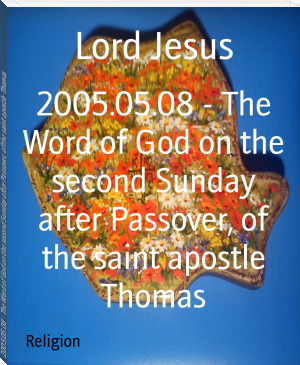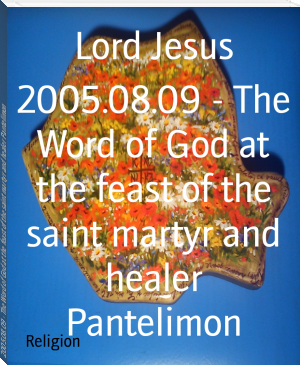The Story of a Soul - Saint Thérèse de Lisieux (best color ereader .TXT) 📗

- Author: Saint Thérèse de Lisieux
- Performer: -
Book online «The Story of a Soul - Saint Thérèse de Lisieux (best color ereader .TXT) 📗». Author Saint Thérèse de Lisieux
Every night the first mistress, carrying her little lamp, opened my bed curtains softly, and kissed me tenderly on the forehead. She showed me such affection that, touched by her kindness, I said one night: "Mother, I love you so much that I am going to tell you a great secret." Then I took from under my pillow the precious little book you had given me, and showed it to her, my eyes sparkling with pleasure. She opened it with care, and, looking through it attentively, told me how privileged I was. In fact, several times during the retreat, the truth came home to me that very few motherless children of my age are as lovingly cared for as I was then.
I listened most attentively to the instructions given us by Father
Domin, and wrote careful notes on them, but I did not put down any
of my own thoughts, as I knew I should remember them quite well.
And so it proved.
How happy I was to attend Divine Office as the nuns did! I was easily distinguished from my companions by a large crucifix, which Léonie had given me, and which, like the missionaries, I carried in my belt. They thought I was trying to imitate my Carmelite sister, and indeed my thoughts did often turn lovingly to her. I knew she was in retreat too, not that Jesus might give Himself to her, but that she might give herself entirely to Jesus, and this on the same day as I made my First Communion. The time of quiet waiting was therefore doubly dear to me.
At last there dawned the most beautiful day of all the days of my life. How perfectly I remember even the smallest details of those sacred hours! the joyful awakening, the reverent and tender embraces of my mistresses and older companions, the room filled with snow-white frocks, where each child was dressed in turn, and, above all, our entrance into the chapel and the melody of the morning hymn: "O Altar of God, where the Angels are hovering."
But I would not and I could not tell you all. Some things lose their fragrance when exposed to the air, and so, too, one's inmost thoughts cannot be translated into earthly words without instantly losing their deep and heavenly meaning. How sweet was the first embrace of Jesus! It was indeed an embrace of love. I felt that I was loved, and I said: "I love Thee, and I give myself to Thee for ever." Jesus asked nothing of me, and claimed no sacrifice; for a long time He and little Thérèse had known and understood one another. That day our meeting was more than simple recognition, it was perfect union. We were no longer two. Thérèse had disappeared like a drop of water lost in the immensity of the ocean; Jesus alone remained—He was the Master, the King! Had not Thérèse asked Him to take away her liberty which frightened her? She felt herself so weak and frail, that she wished to be for ever united to the Divine Strength.
And then my joy became so intense, so deep, that it could not be restrained; tears of happiness welled up and overflowed. My companions were astonished, and asked each other afterwards: "Why did she cry? Had she anything on her conscience? No, it is because neither her Mother nor her dearly loved Carmelite sister is here." And no one understood that all the joy of Heaven had come down into one heart, and that this heart, exiled, weak, and mortal as it was, could not contain it without tears.
How could my Mother's absence grieve me on my First Communion Day? As Heaven itself dwelt in my soul, in receiving a visit from Our Divine Lord I received one from my dear Mother too. Nor was I crying on account of Pauline's absence, for we were even more closely united than before. No, I repeat it—joy alone, a joy too deep for words, overflowed within me.
During the afternoon I read the act of consecration to Our Lady, for myself and my companions. I was chosen probably because I had been deprived of my earthly Mother while still so young. With all my heart I consecrated myself to the Blessed Virgin Mary, and asked her to watch over me. She seemed to look lovingly on her Little Flower and to smile at her again, and I thought of the visible smile which had once cured me, and of all I owed her. Had she not herself, on the morning of that 8th of May, placed in the garden of my soul her Son Jesus—"the Flower of the field and the Lily of the valleys"?[4]
On the evening of this happy day Papa and I went to the Carmel, and I saw Pauline, now become the Spouse of Christ. She wore a white veil like mine and a crown of roses. My joy was unclouded, for I hoped soon to join her, and at her side to wait for Heaven.
I was pleased with the feast prepared for me at home, and was delighted with the beautiful watch given to me by Papa. My happiness was perfect, and nothing troubled the inward peace of my soul. Night came, and so ended that beautiful day. Even the brightest days are followed by darkness; one alone will know no setting, the day of the First and Eternal Communion in our true Home. Somehow the next day seemed sorrowful. The pretty clothes and the presents I had received could not satisfy me. Henceforth Our Lord alone could fill my heart, and all I longed for was the blissful moment when I should receive Him again.
I made my second Communion on Ascension Day, and had the happiness of kneeling at the rails between Papa and Marie. My tears flowed with inexpressible sweetness; I kept repeating those words of St. Paul: "I live now, not I; but Christ liveth in me."[5] After this second visit of Our Lord I longed for nothing else but to receive Him. Alas! the feasts seemed so far apart. . . .
On the eve of these happy days Marie helped me to prepare, as she had done for my First Communion. I remember once she spoke of suffering, and said that in all probability, instead of making me walk by this road, God, in His goodness, would carry me always like a little child. Her words came into my mind next day after my Communion; my heart became inflamed with an ardent desire for suffering, and I felt convinced that many crosses were in store for me. Then my soul was flooded with such consolation as I have never since experienced. Suffering became attractive, and I found in it charms which held me spellbound, though as yet I did not appreciate them to the full.
I had one other great wish; it was to love God only, and to find my joy in Him alone. During my thanksgiving after Holy Communion I often repeated this passage from the Imitation of Christ: "O my God, who art unspeakable sweetness, turn for me into bitterness all the consolations of earth."[6] These words rose to my lips quite naturally; I said them like a child, who, without well understanding, repeats what a friend may suggest. Later on I will tell you, dear Mother, how Our Lord has been pleased to fulfill my desire, how He, and He alone, has always been my joy; but if I were to speak of it now I should have to pass on to my girlhood, and there is still much to tell you of my early days.
Soon after my First Communion I went into retreat again, before being confirmed. I prepared myself with the greatest care for the coming of the Holy Ghost; I could not understand anyone not doing so before receiving this Sacrament of Love. As the ceremony could not take place on the day fixed, I had the consolation of remaining somewhat longer in retreat. How happy I felt! Like the Apostles, I looked with joy for the promised Comforter, gladdened by the thought that I should soon be a perfect Christan, and have the holy Cross, the symbol of this wondrous Sacrament, traced upon my forehead for eternity. I did not feel the mighty wind of the first Pentecost, but rather the gentle breeze which the prophet Elias heard on Mount Horeb. On that day I received the gift of fortitude in suffering—a gift I needed sorely, for the martyrdom of my soul was soon to begin.
When these delightful feasts, which can never be forgotten, were over, I had to resume my life as a day scholar, at the Abbey. I made good progress with my lessons, and remembered easily the sense of what I read, but I had the greatest difficulty in learning by heart; only at catechism were my efforts crowned with success. The Chaplain called me his little "Doctor of Theology,"[7] no doubt because of my name, Thérèse.
During recreation I often gave myself up to serious thoughts, while from a distance I watched my companions at play. This was my favourite occupation, but I had another which gave me real pleasure. I would search carefully for any poor little birds that had fallen dead under the big trees, and I then buried them with great ceremony, all in the same cemetery, in a special grass plot. Sometimes I told stories to my companions, and often even the big girls came to listen; but soon our mistress, very rightly, brought my career as an orator to an end, saying she wanted us to exercise our bodies and not our brains. At this time I chose as friends two little girls of my own age; but how shallow are the hearts of creatures! One of them had to stay at home for some months; while she was away I thought about her very often, and on her return I showed how pleased I was. However, all I got was a glance of indifference—my friendship was not appreciated. I felt this very keenly, and I no longer sought an affection which had proved so inconstant. Nevertheless I still love my little school friend, and continue to pray for her, for God has given me a faithful heart, and when once I love, I love for ever.
Observing that some of the girls were very devoted to one or other of the mistresses, I tried to imitate them, but I never succeeded in winning special favour. O happy failure, from how many evils have you saved me! I am most thankful to Our Lord that He let me find only bitterness in earthly friendships. With a heart like mine, I should have been taken captive and had my wings clipped, and how then should I have been able to "fly away and be at rest"?[8]
How can a heart given up to human affections be closely united to God? It seems to me that it is impossible. I have seen so many souls, allured by this false light, fly right into it like poor moths, and burn their wings, and then return, wounded, to Our Lord, the Divine fire which burns and does not consume. I know well Our Lord saw that I was too weak to be exposed to temptation, for, without doubt, had the deceitful light of created love dazzled my eyes, I should have been entirely consumed. Where strong souls find joy and practise detachment faithfully, I only found bitterness. No merit, then, is due to me for not having given up to these frail ties, since I was only preserved from them by the Mercy of God. I fully realised that without Him I should have fallen as low as St. Mary Magdalen, and the Divine Master's words re-echoed sweetly in my soul. Yes, I know that "To whom less is forgiven he loveth less,"[9] but I know too that Our Lord has forgiven me more than St. Mary Magdalen. Here is an example which will, at any rate, show you some of my thoughts.
Let us suppose that the son of a very clever doctor, stumbling over a stone on the road, falls and breaks his leg. His father hastens to him, lifts him lovingly, and binds up the fractured limb, putting forth all his skill. The son, when cured, displays the utmost gratitude, and he has excellent reason for doing so. But let us take another supposition.
The father, aware that a dangerous stone lies in his son's path, is beforehand with the danger and removes it, unseen by anyone. The son, thus tenderly cared for, not knowing of the mishap from which his father's hand has saved him, naturally will not show him any gratitude, and will love him less than if he had cured him of a grievous wound.





Comments (0)